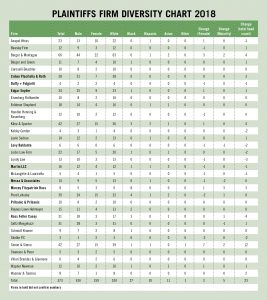Pa.'s Biggest Plaintiffs Firms Grew by 4 Percent in 2018, but Diversity Still Slow to Improve
The Legal Intelligencer's 11th annual survey of 33 plaintiffs firms with more than four lawyers showed that, between 2017 and 2018, the combined overall number of attorneys at those firms grew from 550 to 573, but the number of diverse attorneys grew by only five and the number of women lawyers grew by only three.
February 11, 2019 at 04:33 PM
6 minute read
 Credit: tsyhun/Shutterstock.com
Credit: tsyhun/Shutterstock.com
Overall head count in Pennsylvania's plaintiffs bar grew by more than 4 percent in 2018, but racial and ethnic diversity among the firms surveyed improved by only half a percentage point and gender diversity actually ticked down slightly.
The Legal Intelligencer's 11th annual survey of 33 plaintiffs firms with more than four lawyers showed that, between 2017 and 2018, the combined overall number of attorneys at those firms grew from 550 to 573, but the number of diverse attorneys grew by only five and the number of women lawyers grew by only three.
In 2018, minority attorneys accounted for 8.6 percent of the total head count, up slightly from 8.1 percent in 2017. Meanwhile, women lawyers accounted for 27.7 percent, or 159 attorneys, of the overall total in 2018, down slightly from 28.4 percent in 2017.
 Click to enlarge.
Click to enlarge.A more charitable way to look at those numbers might be to note that, of the 23 new lawyers among the firms surveyed in 2018, diverse lawyers accounted for 22 percent and women attorneys accounted for 13 percent. But plaintiffs attorneys and affinity bar association leaders agreed that the pace of change is still not where it needs to be.
“The aspiration is that there's more representation [of diversity] in every crack and crevice of the group of people administering the law and not just those being prosecuted by it,” said Tianna Kalogerakis, president of the Barristers' Association of Philadelphia and an attorney at Kang Haggerty & Fetbroyt in Philadelphia. “We'll take the increases, but we're going to certainly push for higher yields and more rapid ones.”
According to the survey, the number of white plaintiffs attorneys among the firms surveyed grew from 506 in 2017 to 524 in 2018, though the overall percentage of white lawyers dropped from 92 percent to 91.4 percent. The number of minority attorneys, meanwhile, grew from 44 to 49.
The firms surveyed had 27 black lawyers in 2018—4.7 percent of the total 573 lawyers. In 2017, there were 24 black lawyers at the same group of firms, representing 4.4 percent of the total.
There were 10 Hispanic lawyers at the firms surveyed (1.7 percent) in 2018, down from 12 (2.2 percent) in 2017, and 11 Asian-American lawyers (1.9 percent), up from eight (1.5 percent) in 2017. Only one lawyer accounted for in the survey belonged to a race other than white, black, Hispanic or Asian-American.
In 2017, 13 of 33 firms comprised 30 percent or more women lawyers. In 2018, that number dipped to 12 of 33. And while six of the 33 firms surveyed in 2017 were composed of more than 40 percent women lawyers, only four fit that description in 2018.
(Take our readers' poll on diversity in the workplace.)
Timothy Lawn, president of the Philadelphia Trial Lawyers Association, said his organization has made it a priority to try to get young minority and women lawyers interested in plaintiffs work. He said the PTLA launched an initiative last year aimed at educating students at area law schools about what plaintiffs lawyers do in an effort to make that work more appealing to new graduates on the hunt for jobs.
But the real challenge to improving diversity in the plaintiffs bar, Lawn said, is two-fold: Plaintiffs firms don't hire that often and, when they do, it's usually a lateral hire.
“It's hard to move the needle on something like diversity quickly,” Lawn said, noting that the PTLA's membership has hovered around the same size (just under 1,000 members) for quite a while and that roughly 85 percent of those members have been with the organization for at least 15 years.
Meanwhile, he added, roughly 65 percent of the PTLA's membership comprises small firms and solo attorneys who almost never make new hires.
Still, Lawn, an attorney with Philadelphia-based Raynes Lawn Hehmeyer (formerly Raynes McCarty), said the PTLA is committed to improving diversity among plaintiffs firms in Philadelphia, which is where the majority of the 33 firms surveyed is based.
“We're drilling the message into our members every chance we get,” he said.
One way Lawn said the PTLA seeks to get the word out when firms do have openings is to work with local affinity bar associations to spread the message to their members.
Kalogerakis and other affinity bar association leaders agreed that's one of the best ways for plaintiffs firms to broaden and diversify their reach when seeking to hire new lawyers.
But lateral hiring is often the product of an existing relationship—a firm has a need or a desire to expand and often already has a specific lawyer in mind for the role—so, if you're the leader of a plaintiffs firm and you make hiring decisions, the real key to improving diversity at your firm may be to first improve diversity in your own professional circle.
Melissa Pang, president of the Asian Pacific American Bar Association of Pennsylvania and an attorney at White and Williams in Philadelphia, noted that her organization hosts networking and other events that anyone can buy a ticket to attend.
Pang and Kalogerakis both said firms must be “intentional” in their efforts to improve diversity.
“You have to set measurable goals and try to achieve them,” Pang said. “And you have to keep going at it.”
James Faunes, vice president of the Hispanic Bar Association of Pennsylvania and a plaintiffs attorney at Feldman Shepherd Wohlgelernter Tanner Weinstock Dodig in Philadelphia, said he believes the plaintiffs bar is working hard to improve diversity. He also agreed that, because there's relatively little turnover at plaintiffs firms each year, progress can be slow.
But Faunes added that, given how few opportunities plaintiffs firms get each year to improve diversity through hiring, a “sustained” commitment to identifying and elevating diverse talent is all the more essential.
“As a diverse attorney, I like to imagine that there are plenty of us out there,” he said. “It's about continuing these efforts.”
Read More:
Trial Lawyer Diversity Inched Up Over Decade, but Is That Too Slow?
A Black Partner Responds to GCs on Law Firm Diversity
Pa. Law Firms Must Learn From the Past to Improve Diversity in the Future
This content has been archived. It is available through our partners, LexisNexis® and Bloomberg Law.
To view this content, please continue to their sites.
Not a Lexis Subscriber?
Subscribe Now
Not a Bloomberg Law Subscriber?
Subscribe Now
NOT FOR REPRINT
© 2025 ALM Global, LLC, All Rights Reserved. Request academic re-use from www.copyright.com. All other uses, submit a request to [email protected]. For more information visit Asset & Logo Licensing.
You Might Like
View All

Law Firms Are 'Struggling' With Partner Pay Segmentation, as Top Rainmakers Bring In More Revenue
5 minute read

Trump RTO Mandates Won’t Disrupt Big Law Policies—But Client Expectations Might
6 minute readTrending Stories
- 1Decision of the Day: Trial Court's Sidestep of 'Batson' Deprived Defendant of Challenge to Jury Discrimination
- 2Is Your Law Firm Growing Fast Enough? Scale, Consolidation and Competition
- 3Child Custody: The Dangers of 'Rules of Thumb'
- 4The Spectacle of Rudy Giuliani Returns to the SDNY
- 5Orrick Hires Longtime Weil Partner as New Head of Antitrust Litigation
Who Got The Work
J. Brugh Lower of Gibbons has entered an appearance for industrial equipment supplier Devco Corporation in a pending trademark infringement lawsuit. The suit, accusing the defendant of selling knock-off Graco products, was filed Dec. 18 in New Jersey District Court by Rivkin Radler on behalf of Graco Inc. and Graco Minnesota. The case, assigned to U.S. District Judge Zahid N. Quraishi, is 3:24-cv-11294, Graco Inc. et al v. Devco Corporation.
Who Got The Work
Rebecca Maller-Stein and Kent A. Yalowitz of Arnold & Porter Kaye Scholer have entered their appearances for Hanaco Venture Capital and its executives, Lior Prosor and David Frankel, in a pending securities lawsuit. The action, filed on Dec. 24 in New York Southern District Court by Zell, Aron & Co. on behalf of Goldeneye Advisors, accuses the defendants of negligently and fraudulently managing the plaintiff's $1 million investment. The case, assigned to U.S. District Judge Vernon S. Broderick, is 1:24-cv-09918, Goldeneye Advisors, LLC v. Hanaco Venture Capital, Ltd. et al.
Who Got The Work
Attorneys from A&O Shearman has stepped in as defense counsel for Toronto-Dominion Bank and other defendants in a pending securities class action. The suit, filed Dec. 11 in New York Southern District Court by Bleichmar Fonti & Auld, accuses the defendants of concealing the bank's 'pervasive' deficiencies in regards to its compliance with the Bank Secrecy Act and the quality of its anti-money laundering controls. The case, assigned to U.S. District Judge Arun Subramanian, is 1:24-cv-09445, Gonzalez v. The Toronto-Dominion Bank et al.
Who Got The Work
Crown Castle International, a Pennsylvania company providing shared communications infrastructure, has turned to Luke D. Wolf of Gordon Rees Scully Mansukhani to fend off a pending breach-of-contract lawsuit. The court action, filed Nov. 25 in Michigan Eastern District Court by Hooper Hathaway PC on behalf of The Town Residences LLC, accuses Crown Castle of failing to transfer approximately $30,000 in utility payments from T-Mobile in breach of a roof-top lease and assignment agreement. The case, assigned to U.S. District Judge Susan K. Declercq, is 2:24-cv-13131, The Town Residences LLC v. T-Mobile US, Inc. et al.
Who Got The Work
Wilfred P. Coronato and Daniel M. Schwartz of McCarter & English have stepped in as defense counsel to Electrolux Home Products Inc. in a pending product liability lawsuit. The court action, filed Nov. 26 in New York Eastern District Court by Poulos Lopiccolo PC and Nagel Rice LLP on behalf of David Stern, alleges that the defendant's refrigerators’ drawers and shelving repeatedly break and fall apart within months after purchase. The case, assigned to U.S. District Judge Joan M. Azrack, is 2:24-cv-08204, Stern v. Electrolux Home Products, Inc.
Featured Firms
Law Offices of Gary Martin Hays & Associates, P.C.
(470) 294-1674
Law Offices of Mark E. Salomone
(857) 444-6468
Smith & Hassler
(713) 739-1250





